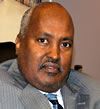In response to Prof. Nuruddin Farah's Aricle
 by Mohamed Abdi Mohamed
by Mohamed Abdi MohamedTuesday, October 22, 2013
I have read the recent article by Nuruddin Farah “Somalia’s Leader: Look past the Hype” and wish to respond to parts of his article.
“One can’t talk about recent news from
Somalia — the deadly attack by Shabaab militants on a U.N. compound in June, the decision in August by Doctors Without Borders to pull out of the country, the massacre last month at a shopping mall in Kenya, for which Al Shabaab took responsibility — without in some way speaking about Somalia’s president, Hassan Sheik Mohamud”.
RESPONSE
“The
presumption that the President is SOMEHOW a common factor of these
three incidents is grossly unfair. The common factor of these incidents
is Al Shabaab. They were the perpetrators of all three attacks in which
innocent non-combatant persons were killed”.
“But
when I last visited Somalia, in April, my friends thought that Mr.
Mohamud didn’t have the determination to lead the country, nor the
hardiness to stand up to clan elders who have contributed so much to the
two-decade-plus civil war and still dominate the country. A former
prime minister, Ali Mohamed Gedi, has called him an incompetent novice”.
RESPONSE
The
opinion of a former Government leader does not in itself lend credulity
to the assertion. Previous leaders always cast doubt as to the mistakes
of the current leadership while current leaders always blame the
previous leadership for current problems. This is the nature of
politics.
“What’s
appalling is that the killer was identified: Ahmed Salad Farey, himself
a former Doctors without Borders worker. He was convicted last year and
sentenced to 30 years in prison. But mysteriously, a panel of appellate
judges ordered his release after he’d served about three months. A
government source whom I trust told me that the government did not open a
public inquiry or even an internal investigation”.
RESPONSE
If this is true, then I would have to admit that this is truly disturbing.
“My
source also told me that Mr. Farey has lived openly in Guriel, his
hometown in central Somalia, since his release, although the president
of the Supreme Court has signed a new warrant for his arrest”.
RESPONSE
This is hearsay. We need to respond to verifiable facts
“A
United Nations monitoring group has accused associates of his of
fleecing the central bank. To refute these explosive charges — which
could lead to the loss of billions of dollars in foreign aid — Mr.
Mohamud hired British and American consultants. But these consultants
were hardly objective: According to The Financial Times, the British
consultants were linked to a potential oil exploration deal, while the
American ones had been hired by the Somali Government to recover
overseas assets”.
RESPONSE
It
is an open secret that bureaucratic corruption has existed in Somalia
for quite sometime. The absence of a credible Public finance System
presents irresistible opportunities for mischief. Unless and until this
is given the priority it deserves, in all probability, some level of
corruption will take place.
“In
a country torn by decades of war, the number of political panhandlers
scavenging for scraps on which to feed their ambitions is too great to
count. Online news sites and radio stations serve up a daily fare of
vitriol and abuse, with contributors propagating their clan’s agendas.
Of the no-holds-barred allegations that have been made, I would point
out two. Ahmed Ismail Samatar, a political scientist at Macalester
College who ran for president last year, has blamed his defeat on vote
rigging and vote buying. Even more troubling, Ali Khalif Gallaydh, a
member of Parliament and a former prime minister, has alleged (citing
unnamed British and American intelligence sources) that Mr. Mohamud has
contacts with Al Shabaab, the Islamist affiliate of Al Qaeda in East
Africa”.
RESPONSE
Using the writer’s own words “It is impossible to tell whether these allegations are true”.
The
writer is highly regarded for his literary skills. He is not known to
have any prior political experience and like many of us, is tempted to
resort to hearsay and innuendo. I am somewhat surprised that Prof. Farah
would be motivated to publish an article based on so much hearsay. I
would advise the learned Professor to stay true to his area of expertise
and not lend his good name to slander and biased opinions.
CONCLUSION
However, the mere existence of this article raises several issues.
First,
Somali intellectuals, particularly those of the diaspora, are
challenged to display a much higher level of objectivity by putting
forward realistic solutions to current challenges.
Second,
the interests of Somalia are not served by adhering to a national
propensity to criticize. Somalis tend to indulge in criticism as some
form of national pastime. For the past twenty years we have wallowed in
this type of behavior with no beneficial result in sight. Now is the
time to put country first and use free speech to reconstruct a new
Somalia.
Third,
Somali intellectuals need to address and agitate for important national
issues such as Public Financial Management reform, establishment of a
Truth & Reconciliation Commission, Anti -Corruption Legislation etc.
Fourth,
all Somalis have a responsibility to lay foundations that solidify
those national characteristics that make us unique as Somalis.
It is my view that there are more things that unite rather than divide us.
Mohamed Abdi Mohamedmmfaracadde2@gmail.com

Comments
Post a Comment